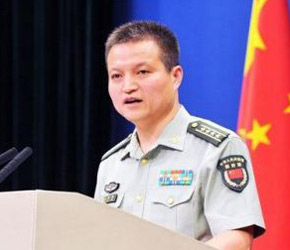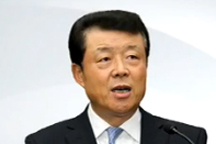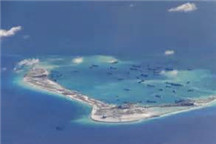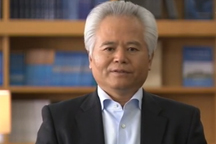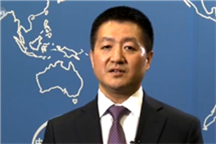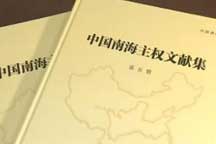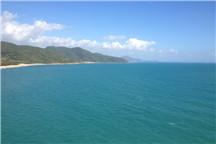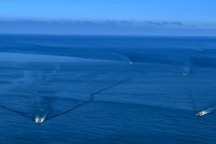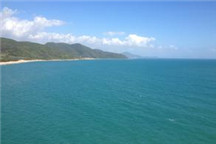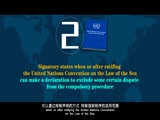The Nansha Islands have been inherent Chinese territory since ancient times. Chinese activities in the South China Sea date back to 2000 years ago. China was the first country to discover, name and exploit the resources of the South China Sea islands. China was also the first country that exercised and has continuously exercised sovereign rights and jurisdiction over the islands.
- 'Joint Sea 2016' starts in South China Sea
- Chinese military aircraft patrol South China Sea
- Chinese FM: China open for contacts with the Philippines
- China & ASEAN discuss resolution of South China Sea issues
- China's supreme court clarifies maritime jurisdiction
- China reiterates arbitration is not legally binding
- Philippines hopes to have bilateral talks on South China Sea
The nine-dashed line was first discovered and owned by China. It is a maritime boundary line formed after China’s long-term jurisdiction and development of the South China Sea islands.
China holds sovereignty and jurisdiction rights within the nine-dashed line. Other countries’ ships have the right to freedom of navigation and their aircraft enjoy rights to fly over the territory.
There had been no problem with the nine-dashed line before the 1970s, but with Vietnam, the Philippines and other countries pushing further territorial claims, more governments are beginning to deny legitimacy of the nine-dashed line.
The United States and other countries have intervened in the South China Sea issue; using the so-called freedom of navigation in the South China Sea to deny the nine-dashed line to disregard China’s territorial rights.
Remarks by Chinese Foreign Minister Wang Yi on the Award of the So-called Arbitral Tribunal in the South China Sea Arbitration
First, the South China Sea arbitration is completely a political farce staged under legal pretext. Such a nature must be exposed for everyone to see.
Second, China’s position of non-acceptance and non-participation is aimed at upholding international rule of law and rules of the region.
Third, China’s territorial sovereignty and maritime rights and interests in the South China Sea are based on solid historical and legal ground. They shall not be affected by the award of the Arbitral Tribunal.
Fourth, China will remain committed to peaceful settlement of disputes through consultation and negotiation, and will continue to work for peace and stability in this region.
China reiterates arbitration is not legally binding
China's Foreign Ministry spokesperson Lu Kang has repeated the country's stance that the award by an arbitral tribunal on the South China Sea issue is not legally binding.
China: Parties should respect Declaration of Conduct
"Over the past 60 years, the Chinese government has always adhered to solving disputes through negotiations and consultations in order to maintain good relations with neighboring countries and more importantly, to safeguard peace and stability of Asia. Asia is now a major driver of economic growth in the world. If Asia's peace and stability is at stake, and if Asia is unable to sustain its growth momentum, what will happen to the world? This is a question Asian countries should ponder on, and so should other countries," said China's vice FM.
China: Japan shouldn't intervene into South China Sea issues
Spokesperson Lu Kang of Chinese Foreign Ministry said that Japan shouldn't intervene into or hype up the South China Sea issue, as it's not a directly involved country. Also Japan has a dishonorable history and not in a right position to give irresponsible comments to China. He made such comments when asked that Japan's Foreign Minister Fumio Kishida said he will discuss with Chinese counterpart on the South China Sea issue, if there is a chance for both to meet in the ASEAN FM meetings.
S. China Sea arbitration another plot hatched by U.S. to reinforce hegemony
The so-called South China Sea arbitration is just a start key for the United States having ulterior motives to agitate the South China Sea situation to reinforce its hegemony. The superpower has always been trying to maintain its hegemony around the world, including the Asia-Pacific region, and turn the western Pacific Ocean into its own sphere of influence, dreaming to turn the South China Sea into the Caribbean where its warships patrol at will.
The right to reject tribunal ruling is real
After the Philippines filed a case in The Hague-based Permanent Court of Arbitration against China in the South China Sea dispute, Beijing has made it clear that it would neither participate in nor accept the ruling of the arbitral tribunal. But despite the extensive international support it has received, Beijing's "non-participation and non-acceptance" stance has been criticized by some Western countries.
S. China Sea arbitration simply bad for Southeast Asia
The South China Sea arbitration unilaterally initiated by former Philippine President Benigno S. Aquino III has not only soured China-Philippines ties, but also undermined international rule of law and regional stability. The arbitration was a bad idea from the beginning for one simple reason: it is detrimental to the interests of the Association of Southeast Asian Nations (ASEAN) that groups 10 member states, including the Philippines.
China not alone in South China Sea issue
As the Chinese government and people's stance on the South China Sea issue wins increasing support worldwide despite the so-called arbitration initiated by the Philippines, the expectation of isolating China has proved unrealistic...Internationally, a wider range of nations, including members of the Association of Southeast Asian Nations (ASEAN), have voiced their recognition of China's position.
Philippines wise to draw experience from U.S. bloody record of intervention
In pointing out the correlation between Washington's meddling in regional affairs and the trail of unrest that ensues, Duterte has taken a bigger leap forward than the previous government, which had jumped to invite the United States into the strategic body of water.
Direct dialogue, joint efforts needed to end South China Sea dispute: Chinese diplomat
In a signed article entitled "Some clarification on the issue of the South China Sea" published by the business daily Les Echos on Monday, the Chinese diplomat said an alternative would be within reach if all countries concerned show a responsible attitude and work together to bridge their differences via friendly consultations and negotiations.
"China will not accept and will not recognize the ruling (of) the tribunal, and expresses its deep concern about the abusive and arbitrary extension of the court's powers," the Chinese ambassador to France said.
* China voices appreciation for support on South China Sea issue
* Arab countries support China's stance on S. China Sea
* All China Lawyers Association issues statement on South China Sea arbitration initiated by the Philippines
* Singapore paper carries article taking dig at Uncle Sam over South China Sea
* China praises Mozambique, Burundi, Slovenia for support on South China Sea
* Bosnia, Herzegovina voices support for China
* Afghanistan, Camboda voice support for China
* Arab countries support Beijing to resolve dispute through friendly negotiations
* Niger calls on int'l judicial and arbitration institutions to respect dispute resolution methods chosen by other countries




